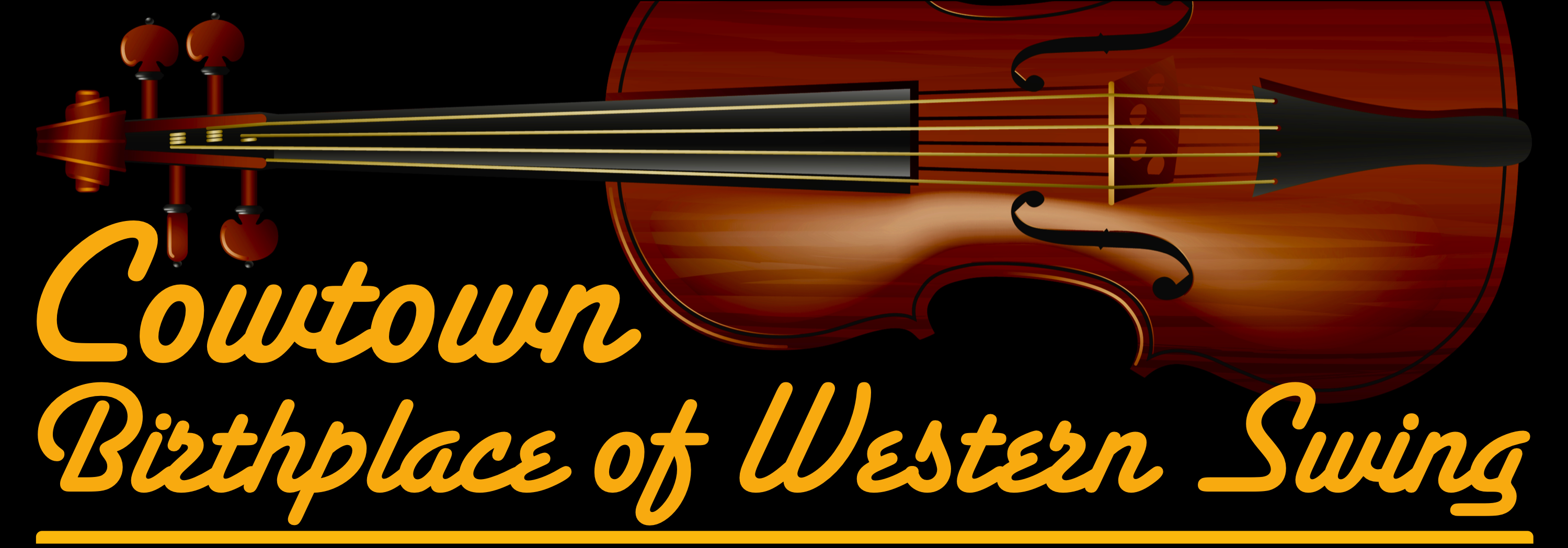Merle Haggard
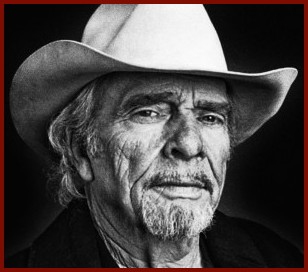 Merle Ronald Haggard (April 6,
1937 - April 6, 2016) was a Western Swing and Country singer, songwriter, guitarist, and fiddler. Along with Buck Owens, Haggard
and his band the Strangers helped create the Bakersfield sound, which is characterized by the twang of the Fender Telecaster
mixed with the Western Swing sounds of steel guitar, twin fiddles, vocal harmony styles in which the words are minimal, and a
rough edge not heard on the more polished Nashville sound recordings of the same era.
Merle Ronald Haggard (April 6,
1937 - April 6, 2016) was a Western Swing and Country singer, songwriter, guitarist, and fiddler. Along with Buck Owens, Haggard
and his band the Strangers helped create the Bakersfield sound, which is characterized by the twang of the Fender Telecaster
mixed with the Western Swing sounds of steel guitar, twin fiddles, vocal harmony styles in which the words are minimal, and a
rough edge not heard on the more polished Nashville sound recordings of the same era.
Born in Oildale, California, during the Great Depression, Haggard's childhood was troubled after the death of his father, and he was incarcerated several times in his youth. After being released from San Quentin State Prison in 1960, he managed to turn his life around and launch a successful country music career, gaining popularity with his songs about the working class that occasionally contained themes contrary to the prevailing anti-Vietnam War sentiment of much popular music of the time. Between the 1960s and the 1980s, he had 38 number-one hits on the US country charts, several of which also made the Billboard all-genre singles chart. Haggard continued to release successful albums into the 2000s.
He received many honors and awards for his music, including a Kennedy Center Honor (2010), a Grammy Lifetime Achievement Award (2006), a BMI Icon Award (2006), and induction into the Nashville Songwriters Hall of Fame (1977), Country Music Hall of Fame (1994), Western Swing Hall of Fame (1995) and Oklahoma Music Hall of Fame (1997). He died on his 79th birthday at his ranch in Shasta County, California, having recently suffered from double pneumonia.
Haggard's last recording, a song called "Kern River Blues," described his departure from Bakersfield in the late 1970s and his displeasure with politicians. The song was recorded February 9, 2016, and features his son Ben on guitar. This record was released posthumously on May 12, 2016.
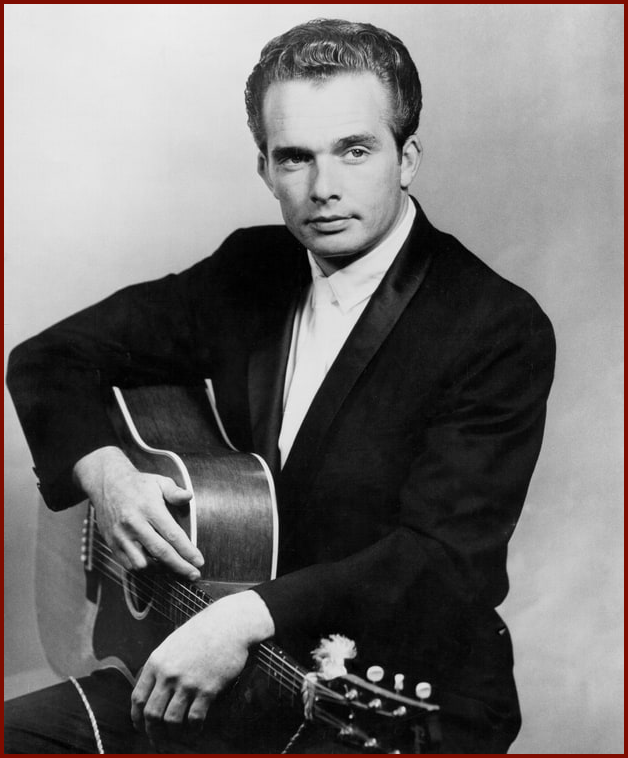 Haggard's parents, Flossie Mae and James Francis Haggard, moved to California from their home in Checotah, Oklahoma, during
the Great Depression, after their barn burned in 1934. They settled with their two elder children, Lowell and Lillian, in an
apartment in Bakersfield, while James started working for the Santa Fe Railroad. A woman who owned a boxcar placed in Oildale,
a nearby town, asked Haggard's father about the possibility of converting it into a house. He remodeled the boxcar, and soon
after moved in, also purchasing the lot, where Merle Ronald Haggard was born on April 6, 1937. The property was eventually
expanded by building a bathroom, a second bedroom, a kitchen, and a breakfast nook in the adjacent lot.
Haggard's parents, Flossie Mae and James Francis Haggard, moved to California from their home in Checotah, Oklahoma, during
the Great Depression, after their barn burned in 1934. They settled with their two elder children, Lowell and Lillian, in an
apartment in Bakersfield, while James started working for the Santa Fe Railroad. A woman who owned a boxcar placed in Oildale,
a nearby town, asked Haggard's father about the possibility of converting it into a house. He remodeled the boxcar, and soon
after moved in, also purchasing the lot, where Merle Ronald Haggard was born on April 6, 1937. The property was eventually
expanded by building a bathroom, a second bedroom, a kitchen, and a breakfast nook in the adjacent lot.
His father died of a brain hemorrhage in 1945, an event that deeply affected Haggard during his childhood and the rest of his life. To support the family, his mother worked as a bookkeeper. At 12, his brother, Lowell, gave him his used guitar. Haggard learned to play alone, with the records he had at home, influenced by Bob Wills, Tommy Duncan, Lefty Frizzell, and Hank Williams. As his mother was absent due to work, Haggard became progressively rebellious. His mother sent him for a weekend to a juvenile detention center to change his attitude, but it worsened.
Haggard committed a number of minor offenses, such as thefts and writing bad checks. He was sent to a juvenile detention center for shoplifting in 1950. When he was 14, Haggard ran away to Texas with his friend Bob Teague. He rode freight trains and hitchhiked throughout the state.
When he returned the same year, he and his friend were arrested for robbery. Haggard and Teague were released when the real robbers were found. Haggard was later sent to the juvenile detention center, from which he and his friend escaped again to Modesto, California. He worked a series of laborer jobs, including driving a potato truck, being a short order cook, a hay pitcher, and an oil well shooter. His debut performance was with Teague in a Modesto bar named "Fun Center", being paid US$5, with free beer.
He returned to Bakersfield in 1951, and was again arrested for truancy and petty larceny and sent to a juvenile detention center. After another escape, he was sent to the Preston School of Industry, a high-security installation. He was released 15 months later, but was sent back after beating a local boy during a burglary attempt. After his release, Haggard and Teague backed Lefty Frizzell in concert. After hearing Haggard sing along to his songs backstage, Frizzell refused to sing unless Haggard would be allowed to sing first. He sang songs that were well received by the audience. Because of this positive reception, Haggard decided to pursue a career in music. While working as a farmhand or in oil fields, he played in nightclubs.
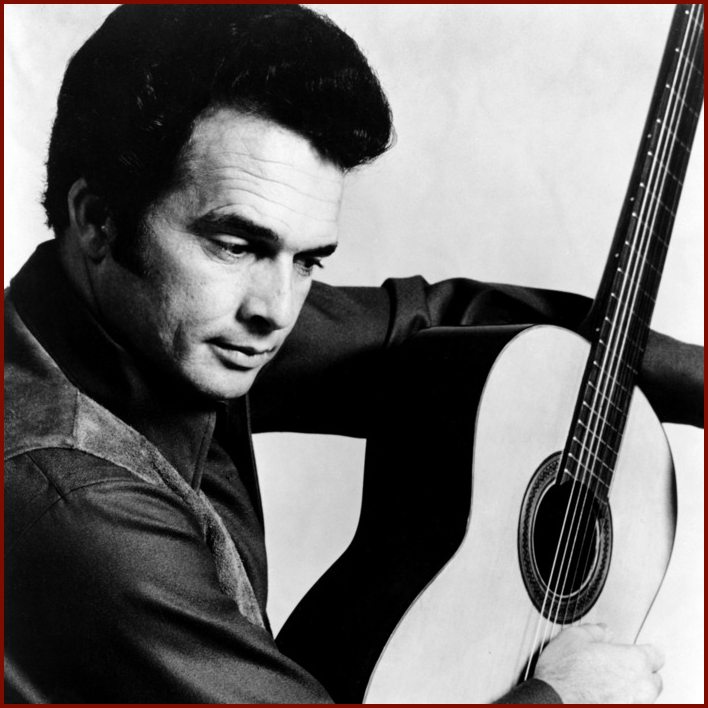 Married and plagued by financial issues, he was arrested in 1957 shortly after he tried to rob a Bakersfield roadhouse. He
was sent to Bakersfield Jail, and after an escape attempt, was transferred to San Quentin Prison on February 21, 1958. While in
prison, Haggard learned that his wife was expecting another man's child, which pressed him psychologically. He was fired from a
series of prison jobs, and planned to escape along with another inmate nicknamed "Rabbit," but was convinced not to escape by
fellow inmates.
Married and plagued by financial issues, he was arrested in 1957 shortly after he tried to rob a Bakersfield roadhouse. He
was sent to Bakersfield Jail, and after an escape attempt, was transferred to San Quentin Prison on February 21, 1958. While in
prison, Haggard learned that his wife was expecting another man's child, which pressed him psychologically. He was fired from a
series of prison jobs, and planned to escape along with another inmate nicknamed "Rabbit," but was convinced not to escape by
fellow inmates.
While at San Quentin, Haggard started a gambling and brewing racket with his cellmate. After he was caught drunk, he was sent for a week to solitary confinement where he encountered Caryl Chessman, an author and death-row inmate. Meanwhile, "Rabbit" had successfully escaped, only to shoot a police officer and be returned to San Quentin for execution. Chessman's predicament, along with the execution of "Rabbit," inspired Haggard to change his life. He soon earned a high school equivalency diploma and kept a steady job in the prison's textile plant. He also played for the prison's country music band, attributing a performance by Johnny Cash at the prison on New Year's Day 1959 as his main inspiration to join it. He was released from San Quentin on parole in 1960.
In 1972, after Haggard had become an established country music star, then-California governor Ronald Reagan granted Haggard a full and unconditional pardon for his past crimes.
Upon his release from San Quentin in 1960, Haggard started digging ditches for his brother's electrical contracting company. Soon, he was performing again, and later began recording with Tally Records. The Bakersfield sound was developing in the area as a reaction against the overproduced Nashville sound. Haggard's first record for Tally was "Singing My Heart Out" backed by "Skid Row"; it was not a success, and only 200 copies were pressed. In 1962, Haggard wound up performing at a Wynn Stewart show in Las Vegas and heard Wynn's "Sing a Sad Song." He asked for permission to record it, and the resulting single was a national hit in 1964. The following year, he had his first national top-10 record with "(My Friends Are Gonna Be) Strangers," written by Liz Anderson, mother of country singer Lynn Anderson, and his career was off and running. Haggard recalls having been talked into visiting Anderson-a woman he did not know-at her house to hear her sing some songs she had written. "If there was anything I didn't wanna do, it was sit around some danged woman's house and listen to her cute little songs. But I went anyway. She was a pleasant enough lady, pretty, with a nice smile, but I was all set to be bored to death, even more so when she got out a whole bunch of songs and went over to an old pump organ.... There they were. My God, one hit right after another. There must have been four or five number one songs there...."
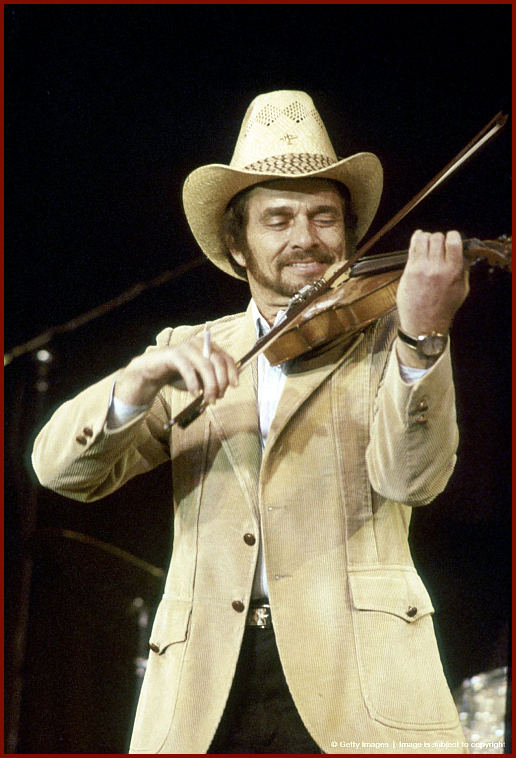 In 1967, Haggard recorded "I'm a Lonesome Fugitive" with his new band The Strangers, also written by Liz Anderson, with her
husband Casey Anderson, which became his first number-one single. When the Andersons presented the song to Haggard, they were
unaware of his prison stretch. Bonnie Owens, Haggard's backup singer and then-wife, is quoted by music journalist Daniel Cooper
in the liner notes to the 1994 retrospective Down Every Road: "I guess I didn't realize how much the experience at San Quentin
did to him, 'cause he never talked about it all that much ... I could tell he was in a dark mood ... and I said, 'Is everything
okay?' And he said, 'I'm really scared.' And I said, 'Why?' And he said, 'Cause I'm afraid someday I'm gonna be out there ... and
there's gonna be ... some prisoner ... in there the same time I was in, stand up-and they're gonna be about the third row down-and
say, 'What do you think you're doing, 45200?'" Cooper notes that the news had little effect on Haggard's career: "It's unclear
when or where Merle first acknowledged to the public that his prison songs were rooted in personal history, for to his credit, he
doesn't seem to have made some big splash announcement. In a May 1967 profile in Music City News, his prison record is never
mentioned, but in July 1968, in the very same publication, it's spoken of as if it were common knowledge."
In 1967, Haggard recorded "I'm a Lonesome Fugitive" with his new band The Strangers, also written by Liz Anderson, with her
husband Casey Anderson, which became his first number-one single. When the Andersons presented the song to Haggard, they were
unaware of his prison stretch. Bonnie Owens, Haggard's backup singer and then-wife, is quoted by music journalist Daniel Cooper
in the liner notes to the 1994 retrospective Down Every Road: "I guess I didn't realize how much the experience at San Quentin
did to him, 'cause he never talked about it all that much ... I could tell he was in a dark mood ... and I said, 'Is everything
okay?' And he said, 'I'm really scared.' And I said, 'Why?' And he said, 'Cause I'm afraid someday I'm gonna be out there ... and
there's gonna be ... some prisoner ... in there the same time I was in, stand up-and they're gonna be about the third row down-and
say, 'What do you think you're doing, 45200?'" Cooper notes that the news had little effect on Haggard's career: "It's unclear
when or where Merle first acknowledged to the public that his prison songs were rooted in personal history, for to his credit, he
doesn't seem to have made some big splash announcement. In a May 1967 profile in Music City News, his prison record is never
mentioned, but in July 1968, in the very same publication, it's spoken of as if it were common knowledge."
The 1967 album Branded Man with The Strangers kicked off an artistically and commercially successful run for Haggard. In 2013, Haggard biographer David Cantwell stated, "The immediate successors to I'm a Lonesome Fugitive-Branded Man in 1967 and, in '68, Sing Me Back Home and The Legend of Bonnie and Clyde-were among the finest albums of their respective years." Haggard's new recordings showcased his band The Strangers, specifically Roy Nichols's Telecaster, Ralph Mooney's steel guitar, and the harmony vocals provided by Bonnie Owens.
Towards the end of the decade, Haggard composed several number-one hits, including "Mama Tried," "The Legend of Bonnie and Clyde," "Hungry Eyes," and "Sing Me Back Home." Daniel Cooper calls "Sing Me Back Home" "a ballad that works on so many different levels of the soul it defies one's every attempt to analyze it." In a 1977 interview in Billboard with Bob Eubanks, Haggard reflected, "Even though the crime was brutal and the guy was an incorrigible criminal, it's a feeling you never forget when you see someone you know make that last walk. They bring him through the yard, and there's a guard in front and a guard behind-that's how you know its a death prisoner. They brought Rabbit out ... taking him to see the Father, ... prior to his execution. That was a strong picture that was left in my mind." In 1969, Haggard's first tribute LP Same Train, Different Time: A Tribute to Jimmie Rodgers, was also released to acclaim.
Haggard's songs attracted attention from outside the country field. The Everly Brothers covered both "Sing Me Back Home" and "Mama Tried" on their 1968 country-rock album Roots. The following year, Haggard's songs were performed or recorded by a variety of artists, including the Gram Parsons incarnation of the Byrds, who performed "Sing Me Back Home" on the Grand Ole Opry and recorded "Life in Prison" for their album Sweetheart of the Rodeo; singer-activist Joan Baez, who covered "Sing Me Back Home" and "Mama Tried"; crooner Dean Martin, who recorded "I Take a Lot of Pride in What I Am" for his album of the same name; and the Grateful Dead, whose live cover of "Mama Tried" became a staple in their repertoire until the band's end in 1995.
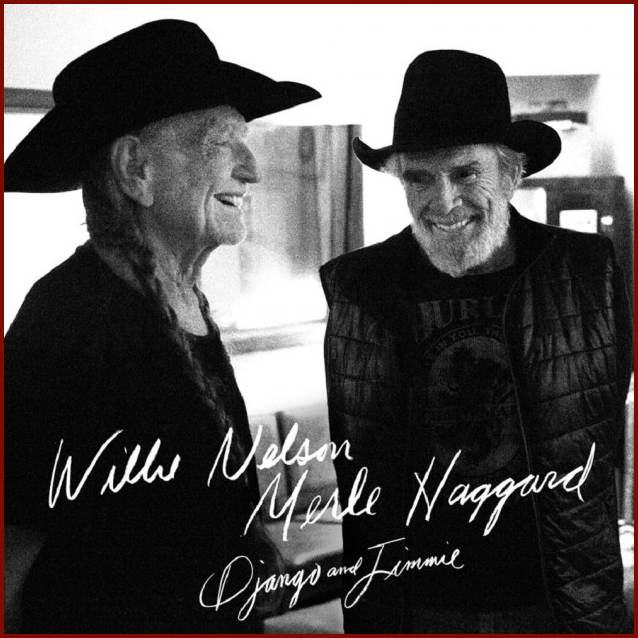 In the original Rolling Stone
review for Haggard and The Strangers 1968 album Mama Tried, Andy Wickham wrote, "His songs
romanticize the hardships and tragedies of America's transient proletarian and his success is resultant of his inherent ability
to relate to his audience a commonplace experience with precisely the right emotional pitch.... Merle Haggard looks the part and
sounds the part because he is the part. He's lived it."
In the original Rolling Stone
review for Haggard and The Strangers 1968 album Mama Tried, Andy Wickham wrote, "His songs
romanticize the hardships and tragedies of America's transient proletarian and his success is resultant of his inherent ability
to relate to his audience a commonplace experience with precisely the right emotional pitch.... Merle Haggard looks the part and
sounds the part because he is the part. He's lived it."
In 1969, Haggard and The Strangers released "Okie From Muskogee," with lyrics ostensibly reflecting the singer's pride in being from Middle America where people are conventionally patriotic, don't smoke marijuana, don't take LSD, don't protest by burning draft cards or otherwise challenge authority. In the ensuing years, Haggard gave varying statements regarding whether he intended the song as a humorous satire or a serious political statement in support of conservative values. In a 2001 interview, Haggard called the song a "documentation of the uneducated that lived in America at the time." However, he made several other statements suggesting that he meant the song seriously. On the Bob Edwards Show, he said, "I wrote it when I recently got out of the joint. I knew what it was like to lose my freedom, and I was getting really mad at these protesters. They didn't know anything more about the war in Vietnam than I did. I thought how my dad, who was from Oklahoma, would have felt. I felt I knew how those boys fighting in Vietnam felt." In the country music documentary series Lost Highway, he elaborated: "My dad passed away when I was nine, and I don't know if you've ever thought about somebody you've lost and you say, 'I wonder what so-and-so would think about this?' I was drivin' on Interstate 40 and I saw a sign that said '19 Miles to Muskogee.' Muskogee was always referred to in my childhood as 'back home.' So I saw that sign and my whole childhood flashed before my eyes and I thought, 'I wonder what dad would think about the youthful uprising that was occurring at the time, the Janis Joplins.... I understood 'em, I got along with it, but what if he was to come alive at this moment? And I thought, what a way to describe the kind of people in America that are still sittin' in the center of the country sayin', 'What is goin' on on these campuses?'" In the American Masters documentary about him, he said, "That's how I got into it with the hippies.... I thought they were unqualified to judge America, and I thought they were lookin' down their noses at something that I cherished very much, and it pissed me off. And I thought, 'You sons of bitches, you've never been restricted away from this great, wonderful country, and yet here you are in the streets bitchin' about things, protesting about a war that they didn't know any more about than I did. They weren't over there fightin' that war any more than I was." Haggard began performing the song in concert in 1969 and was astounded at the reaction it received:
- The studio version, which was mellower than the usually raucous live-concert versions, topped the country charts in 1969, where it remained for a month. It also hit number 41 on the Billboard all-genre singles chart, becoming Haggard's biggest hit up to that time, surpassed only by his 1973 crossover Christmas hit, "If We Make It Through December," which peaked at number 28.
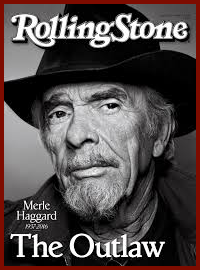 On his next single, "The Fightin' Side of Me," released by his record company in 1970 over Haggard's objections, Haggard's
lyrics stated that he did not mind the counterculture "switchin' sides and standin' up for what they believe in," but resolutely
declared, "If you don't love it, leave it!" In May 1970, Haggard explained to John Grissom of Rolling Stone, "I don't like their
views on life, their filth, their visible self-disrespect, y'know. They don't give a shit what they look like or what they smell
like.... What do they have to offer humanity?"
On his next single, "The Fightin' Side of Me," released by his record company in 1970 over Haggard's objections, Haggard's
lyrics stated that he did not mind the counterculture "switchin' sides and standin' up for what they believe in," but resolutely
declared, "If you don't love it, leave it!" In May 1970, Haggard explained to John Grissom of Rolling Stone, "I don't like their
views on life, their filth, their visible self-disrespect, y'know. They don't give a shit what they look like or what they smell
like.... What do they have to offer humanity?"
Haggard had wanted to follow "Okie from Muskogee" with "Irma Jackson," a song that dealt with an interracial romance between a white man and an African American woman. His producer, Ken Nelson, discouraged him from releasing it as a single. Jonathan Bernstein recounts, "Hoping to distance himself from the harshly right-wing image he had accrued in the wake of the hippie-bashing "Muskogee," Haggard wanted to take a different direction and release "Irma Jackson" as his next single.... When the Bakersfield, California, native brought the song to his record label, executives were reportedly appalled. In the wake of "Okie," Capitol Records was not interested in complicating Haggard's conservative, blue-collar image."
"Okie From Muskogee," "The Fightin' Side of Me," and "I Wonder If They Think of Me" (Haggard's 1973 song about an American POW in Vietnam) were hailed as anthems of the Silent Majority and have been recognized as part of a recurring patriotic trend in American country music that also includes Charlie Daniels' "In America" and Lee Greenwood's "God Bless the USA."
Haggard's 1970 LP A Tribute to the Best Damn Fiddle Player in the World, dedicated to Bob Wills, helped spark a permanent revival and expanded the audience for Western Swing. By this point, Haggard was one of the most famous country singers in the world, having enjoyed an immensely successful artistic and commercial run with Capitol, accumulating 24 number-one country singles since 1966. His tribute album displayed his love for the great dance music genre that Wills created in Texas in the 1930s and brought to Bakersfield and the entire West Coast in the 1940s.
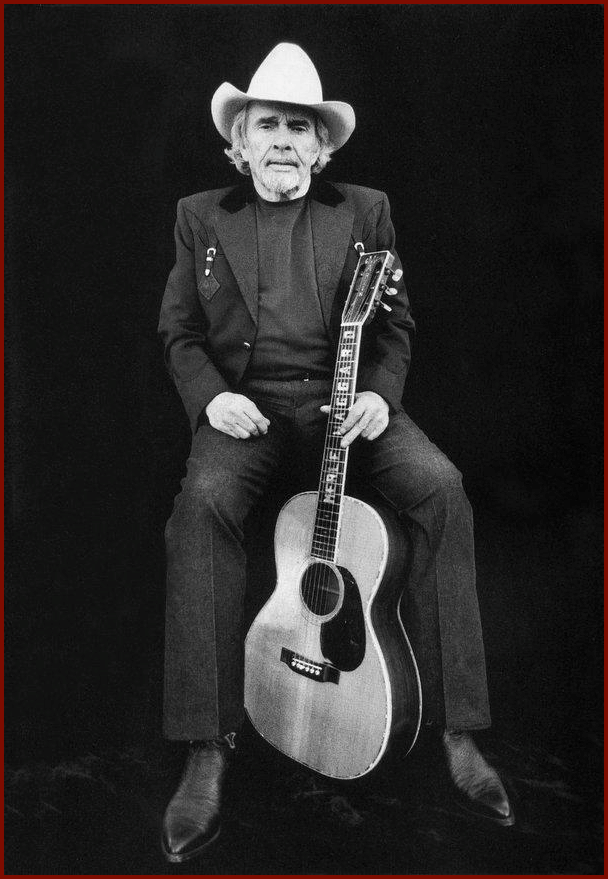 In 1973, Haggard collaborated with six of the remaining members of the Texas Playboys to record with Bob Wills on his final album
For The Last Time, Bob Wills & his Texas Playboys, together with his brother Johnnie Lee Wills, Eldon Shamblin, Tiny Moore, Joe Holley,
Johnny Gimble, and Alex Brashear. Sadly, Wills suffered a massive stroke after the first day of recording. Merle arrived on the second
day, devastated that he would not get to record with him, but the album helped return Wills to public consciousness, and set off a
Western Swing revival across the country. Haggard did other tribute albums to Bob Wills over the next 40 years. In 1994, Haggard
collaborated with Asleep at the Wheel and many other artists influenced by the music of Bob Wills on an album entitled A Tribute
To The Music of Bob Wills and the Texas Playboys.
In 1973, Haggard collaborated with six of the remaining members of the Texas Playboys to record with Bob Wills on his final album
For The Last Time, Bob Wills & his Texas Playboys, together with his brother Johnnie Lee Wills, Eldon Shamblin, Tiny Moore, Joe Holley,
Johnny Gimble, and Alex Brashear. Sadly, Wills suffered a massive stroke after the first day of recording. Merle arrived on the second
day, devastated that he would not get to record with him, but the album helped return Wills to public consciousness, and set off a
Western Swing revival across the country. Haggard did other tribute albums to Bob Wills over the next 40 years. In 1994, Haggard
collaborated with Asleep at the Wheel and many other artists influenced by the music of Bob Wills on an album entitled A Tribute
To The Music of Bob Wills and the Texas Playboys.
Haggard appeared on the cover of TIME on May 6, 1974. He also wrote and performed the theme song to the television series
Movin' On, which in 1975 gave him and The Strangers another number-one country hit. During the early to mid-1970s, Haggard and
The Strangers country chart domination continued with songs such as "Someday We'll Look Back," "Grandma Harp," "Always Wanting
You," and "The Roots of My Raising." Between 1973 and 1976, he and The Strangers scored nine consecutive number-one country
hits. In 1977, he switched to MCA Records and began exploring the themes of depression, alcoholism, and middle age on albums
such as Serving 190 Proof and The Way I Am. Haggard sang a duet cover of Billy Burnette's "What's A Little Love Between Friends"
with Lynda Carter in her 1980 television music special, Lynda Carter: Encore! He also scored a number-one hit in 1980 with
"Bar Room Buddies," a duet with actor Clint Eastwood that appeared on the Bronco Billy soundtrack.
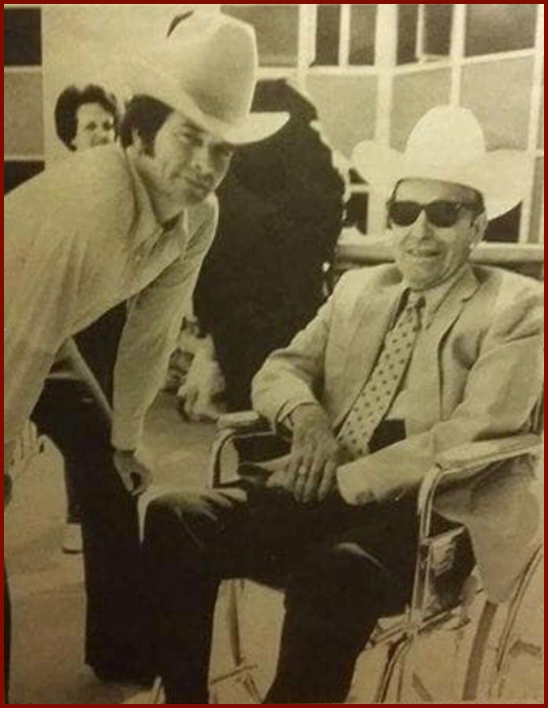
Between 1981 and 1985, Haggard scored 12 more top-10 country hits, with nine of them reaching number one, including "Big City", "My Favorite Memory," "Going Where the Lonely Go," "Someday When Things Are Good," and "Natural High." In addition, Haggard recorded two chart-topping duets with George Jones-"Yesterdays' Wine" in 1982-and with Willie Nelson-"Pancho and Lefty" in 1983. Nelson believed the 1983 Academy Award-winning film Tender Mercies, about the life of fictional singer Mac Sledge, was based on the life of Merle Haggard. Filmmakers denied this and claimed the character was based on nobody in particular. Duvall, however, said he was a huge fan of Haggard's and modeled his character after his favorite "outlaw" artist.
In 1983, Haggard and his third wife Leona Williams divorced after five stormy years of marriage. The split served as a license to party for Haggard, who spent much of the next decade becoming mired in alcohol and drug problems. Haggard has stated that he was in his own mid-life crisis around this time. He was briefly a heavy user of cocaine, but managed to kick the habit. Despite these issues, he won a Grammy Award for Best Male Country Vocal Performance for his 1984 remake of "That's The Way Love Goes."
Haggard was hampered by financial woes well into the 1990s, as his presence on the charts diminished in favor of newer country singers, such as George Strait and Randy Travis. Haggard's last number-one hit was "Twinkle, Twinkle Lucky Star" from his smash album Chill Factor in 1988.
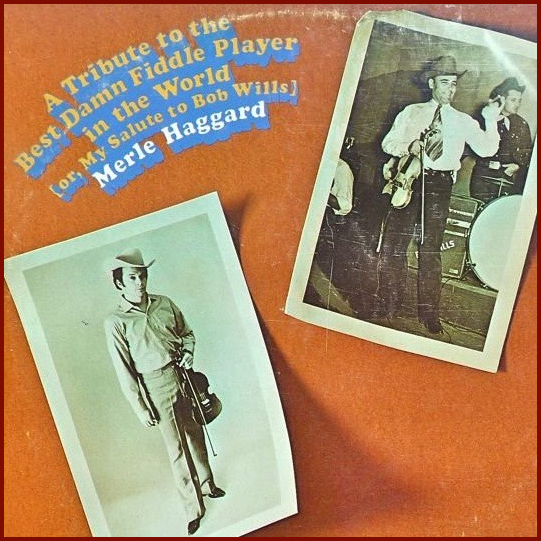 In 2000, Haggard made a comeback of sorts, signing with the independent record label Anti and releasing the spare If I
Could Only Fly to critical acclaim. He followed it in 2001 with Roots, vol. 1, a collection of Lefty Frizzell, Hank Williams,
and Hank Thompson covers, along with three Haggard originals. The album, recorded in Haggard's living room with no overdubs,
featured Haggard's longtime bandmates, The Strangers, as well as Frizzell's original lead guitarist, Norman Stephens. In
December 2004, Haggard spoke at length on Larry King Live about his incarceration as a young man and said it was "hell" and
"the scariest experience of my life."
In 2000, Haggard made a comeback of sorts, signing with the independent record label Anti and releasing the spare If I
Could Only Fly to critical acclaim. He followed it in 2001 with Roots, vol. 1, a collection of Lefty Frizzell, Hank Williams,
and Hank Thompson covers, along with three Haggard originals. The album, recorded in Haggard's living room with no overdubs,
featured Haggard's longtime bandmates, The Strangers, as well as Frizzell's original lead guitarist, Norman Stephens. In
December 2004, Haggard spoke at length on Larry King Live about his incarceration as a young man and said it was "hell" and
"the scariest experience of my life."
In October 2005, Haggard released his album Chicago Wind to mostly positive reviews. The album contained an anti-Iraq war song titled "America First," in which he laments the nation's economy and faltering infrastructure, applauds its soldiers, and sings, "Let's get out of Iraq, and get back on track." This follows from his 2003 release "Haggard Like Never Before" in which he includes a song, "That's The News." Haggard released a bluegrass album, The Bluegrass Sessions, on October 2, 2007.
Haggard would work together again with Willie Nelson and Ray Price in 2007, releasing the album Last of the Breed. In 2015, Haggard and Nelson recorded a video, "It's All Going to Pot," where both are seen singing in a recording studio while smoking joints. The two also recorded another duet album Django and Jimmie. In early 2016 Haggard appeared alongside Willie Nelson in the award-winning documentary The American Epic Sessions directed by Bernard MacMahon. They performed a song Haggard had composed for the film, "The Only Man Wilder Than Me" and Bob Wills' classic "Old Fashioned Love", which they recorded live on the Wills restored first electrical sound recording system from the 1920s. It was the last filmed performance of the pair, with Rolling Stone commenting "in the final performance of Sessions, Willie Nelson and Merle Haggard perform the duet "The Only Man Wilder Than Me." Haggard has a look of complete joy on his face throughout the session in the old-timey recording set-up once used by his Western Swing musical heroes.
Haggard was treated for double pneumonia in December 2015, and in March 2016 was once again hospitalized. His concerts for April were canceled due to his ongoing double pneumonia. On the morning of April 6, 2016, his 79th birthday, he died of complications from pneumonia at his home in Palo Cedro, Shasta County, California. Haggard was buried in a private funeral at his ranch on April 9, 2016; longtime friend Marty Stuart officiated.
Haggard's authentic traditional country voice gave his songs a hard-edged, blues-like style on most of his cuts. Although he was outspoken in his dislike for modern country music, he praised George Strait, Toby Keith, and Alan Jackson. Keith has singled out Haggard as a major influence on his career. As noted by an article published in The Washington Post just after Haggard's death, "Respect for the 'Hag' as an icon, both for musical status and his personal views, is a common theme" in country music.
